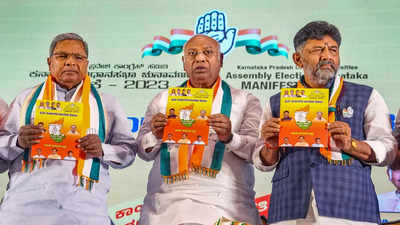- News
- Elections News
- Assembly Elections News
- Karnataka News
- Karnataka election win ensures Congress will retain 3 Rajya Sabha seats
This story is from May 15, 2023
Karnataka election win ensures Congress will retain 3 Rajya Sabha seats
The emphatic victory in the Karnataka assembly elections will not only help Congress retain its three Rajya Sabha seats next year when four Upper House members from the state retire but also take the party's strength from the existing five to seven in the next three years.

Former Karnataka CM Siddaramaiah, Congress president Mallikarjun Kharge and Karnataka Congress chief DK Shivakumar (PTI photo)
NEW DELHI: The emphatic victory in the Karnataka assembly elections will not only help Congress retain its three Rajya Sabha seats next year when four Upper House members from the state retire but also take the party's strength from the existing five to seven in the next three years. The JD(S), on the other hand, will be without any RS member from the state by mid-2026 when H D Deve Gowda's tenure ends.
BJPwill retain its lone seat in the list of four who retire in 2024, but the party will see its strength from the state reduced by 2026. Though the Karnataka loss will not significantly change BJP's overall position in the Upper House where the party has 92 members, it will make a dent in its goal to have an NDA majority in the Rajya Sabha.
The four RS members who will retire next year include BJP MP and Union minister Rajeev Chandrasekhar and three Congress MPs - L Hanumanthaiah, Syed Nasir Hussain and G C Chandrashekhar. Four RS members each from Karnataka will retire in 2026 and 2028.
Currently, six seats - four from J&K and two nominated - are vacant in the Rajya Sabha, bringing down its strength to 239. BJP is the largest party with 92 MPs followed by Congress (31), TMC (13), DMK and Aam Aadmi Party with 10 each; Biju Janata Dal and YSR Congress with nine each; Telangana Rashtra Samithi (7) and Rashtriya Janata Dal (6).
Any noticeable change in the party-wise composition in the Upper House is expected only in March-April 2024 (ahead of the next parliamentary elections) when 56 seats go to polls in the biennial election.
BJPwill retain its lone seat in the list of four who retire in 2024, but the party will see its strength from the state reduced by 2026. Though the Karnataka loss will not significantly change BJP's overall position in the Upper House where the party has 92 members, it will make a dent in its goal to have an NDA majority in the Rajya Sabha.
The four RS members who will retire next year include BJP MP and Union minister Rajeev Chandrasekhar and three Congress MPs - L Hanumanthaiah, Syed Nasir Hussain and G C Chandrashekhar. Four RS members each from Karnataka will retire in 2026 and 2028.
Currently, six seats - four from J&K and two nominated - are vacant in the Rajya Sabha, bringing down its strength to 239. BJP is the largest party with 92 MPs followed by Congress (31), TMC (13), DMK and Aam Aadmi Party with 10 each; Biju Janata Dal and YSR Congress with nine each; Telangana Rashtra Samithi (7) and Rashtriya Janata Dal (6).
Rajya Sabha statistics show that the overall composition of the Upper House will not effectively change this year even when 10 seats go vacant due to retirement of members. This year, Goa will see one vacancy in July while West Bengal and Gujarat will face vacancy of six and three seats, respectively, in August.
Any noticeable change in the party-wise composition in the Upper House is expected only in March-April 2024 (ahead of the next parliamentary elections) when 56 seats go to polls in the biennial election.
End of Article
FOLLOW US ON SOCIAL MEDIA

